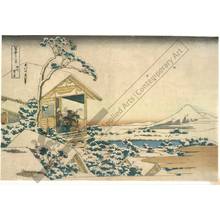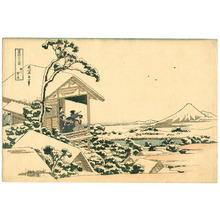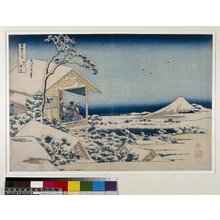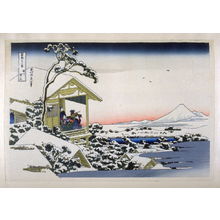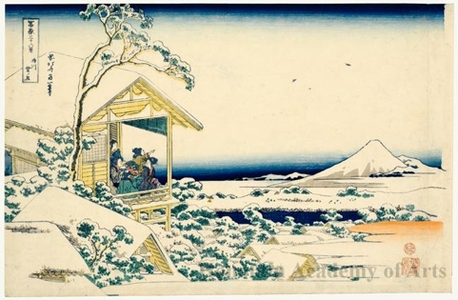Estampe japonaise "Morning after Snow at Koishikawa" par Katsushika Hokusai
Artiste :Katsushika Hokusai
Titre :Morning after Snow at Koishikawa
Date :c. 1830 - 1834
Détails :Plus d'informations...
Source :Honolulu Museum of Art
Parcourir toutes les 5 476 estampes...
Description :
Men and women in a pavilion leisurely enjoy the view of a distant, snow-covered Mount Fuji. Hokusai shows one woman at the right wearing a sophisticated, blue striped kimono over a contrasting bright red undergarment. Striped kimonos were widely enjoyed by men and women of modest means. Stripes are perhaps the easiest pattern to create on a simple country loom and were widely used to decorate commoner's garments. By alternating warp or weft thread colors, stripes of many varieties were easily achieved-vertical, horizontal, or, by combining both warp and weft, crisscrossing checkerboards. Further, by varying the hues and the width of stripes, weavers were able to create practical garments that boasted surprisingly subtle and sophisticated patterns. Interestingly, early stripe patterns found in Japanese textiles were always horizontal, created by alternating the color of the weft threads. (from “Blue and White” textiles exhibition 8/28/2008-) - - - - - - - - - - - Though he excelled at dealing with rolling waves and dashing water, Hokusai seldom depicted snow scenes. As a powerful designer with a meticulous sense of detail, he perhaps was not inclined to treat snow, which covers details and blurs clarity. His young competitor, Hiroshige, dealt superbly with snow and rain, for the very reasons that Hokusai avoided them. A lyrical artist, Hiroshige used snow and rain to evoke emotion, not to describe images in precise detail. Snowy Morning at Koishikawa is a rare example of Hokusai’s snow scenes. On an ice-cold winter morning, people awake to find their world has changed overnight, covered by clean, fresh, silvery white snow. Here they gather in a second-floor room with doors wide open, excitedly looking at the scene, and above all at Mount Fuji, which is completely cloaked in snow. Koishikawa is located in present-day Bunkyö ward. The district is known for its hills, which are suitable for viewing Fuji. Some restaurants advertised themselves as being good spots for viewing the mountain. The publisher’s and the censor’s seal are in the lower right corner. The key-block was printed in blue. (The Asian Art Museum of San Francisco, HOKUSAI AND HIROSHIGE – Great Japanese Prints from the James A. Michener Collection, Honolulu Academy of Arts: The Asian Art Museum of San Francisco, 1998 Page 78. Cat. 29) ******************** Located in the modern Bunkyö ward of Tokyo, the hilly area of Koishikawa was famous for its views of Mount Fuji. As a result, the area was popular for inns and teahouses, which used these views to attract customers. Here a group of women admire the sight of Mount Fuji covered with new snow from the veranda of their inn, while a servant carries a tray heavily laden with breakfast. Unlike Hiroshige, who used snowscapes to great effect in producing lyrical images of the Japanese countryside, Hokusai designed few scenes with snow, of which this is a rare example. The snow-covered landscape is further softened by printing the key block outlines in blue rather than black, a feature found in all of the original thirty-six prints from the Thirty-six Views of Mount Fuji series. By the 1820s, imported “Prussian blue” was widely available, offering Japanese artists a more stable, lasting blue that was less sensitive to fading. This created a fashion for designs using blue as the dominant color when the Thirty-six Views first were published, evidence of which can be found in many of the prints from the series. “Hokusai’s Summit: Thirty-six Views of Mount Fuji” (09/24/2009-01/06/2010) ******************************
Estampes Similaires
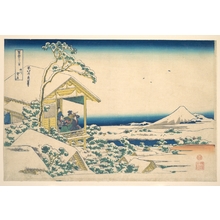
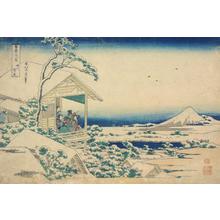
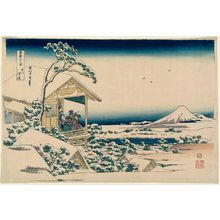
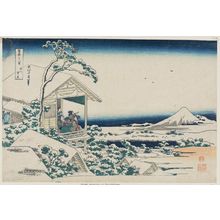
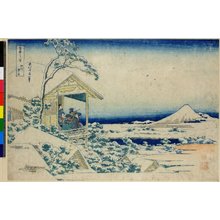
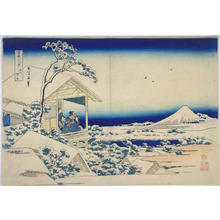
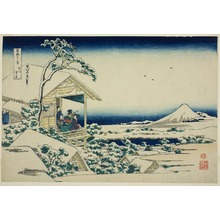
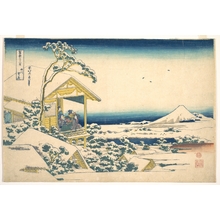
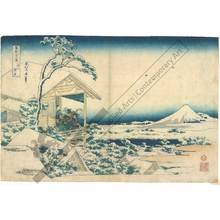
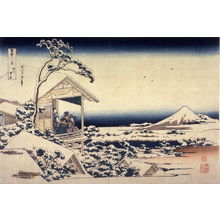
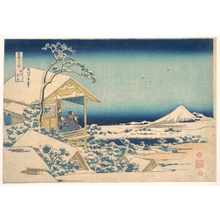
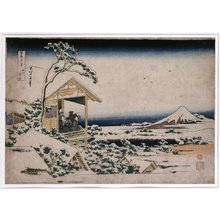
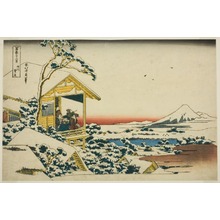
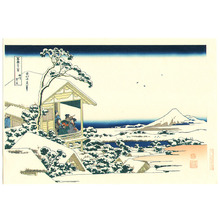
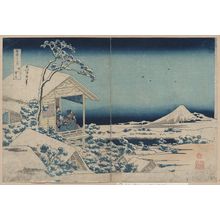
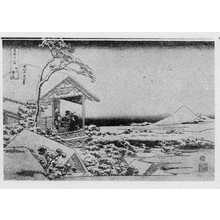
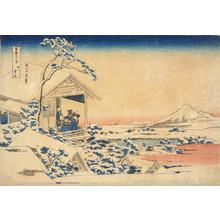
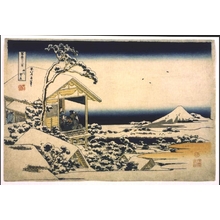
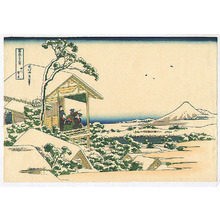
![[Teahouse at Koishikawa the morning after a snowfall] Estampe japonaise "[Teahouse at Koishikawa the morning after a snowfall]" par Katsushika Hokusai, 葛飾北斎 (Katsushika Hokusai)](https://data.ukiyo-e.org/loc/thumbs/02457v.jpg)
